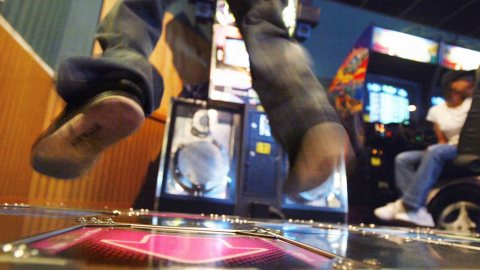Why Friendly Competition May Be the Best Fitness Motivator Yet

Group fitness is a term that helps explain an important evolutionary leap forward. The fitness of the group increases chances of survival. History shows cooperation works better than individualism. Our social nature is a necessary key in dominance over the rest of the animal kingdom.
As psychologist and evolutionary anthropologist Michael Tomasello has stated, you will never find two chimpanzees carrying a log together.
Group fitness has a more modern connotation as well: exercising with others in a class. While the energy of the group is raised the more people there are in the room, exercising with even one other person increases the efficacy of your workouts. As I wrote earlier this year, even connecting to a friend through fitness trackers or other online platforms provides a healthy boost to your movement regimen.
Trackers and online platforms do have a downside: they can lead to exercise addiction. Overly ambitious step counts can result in stress fractures; the lack of down regulation and recovery incites emotional fanaticism. That said, humans are competitive creatures, which is a good thing. Competition ups the ante, forcing you to exercise harder and longer, which is what a recent study published in JAMA Internal Medicineshows:
New research shows families who used activity trackers with specially designed gaming elements increased daily step counts by nearly one mile per day and achieved daily fitness goals 27 percent more than families who did not.
Over a twelve-week intervention period and twelve-week follow-up conducted in 2016, 200 adults from 94 families tracked daily step counts on their wrist or smartphone app. The researchers were testing a social incentive theory from behavioral economics to see if turning exercise into a game would increase performance.
With a mean age of 55.4 years and 56 percent female and 44 percent male participants, the gamification of walking resulted in a significantly greater proportion of steps. Even in the follow-up period, the gameified group, no longer beholden to trackers, still outperformed the control group, though their performance did drop.
During the intervention period, the gameified group ended up with an additional 1,700 steps above their baseline, a daily increase of nearly a mile. Their reward? A coffee mug. That was intentional, as researchers did not want the goal to be enticing. They wanted to know if people would excel via willpower alone.

Numbers help. I teach group fitness to hundreds of Equinox members six days a week. While most do not wear trackers during class, those who do are diligent in their tracking and devoted to their counts. While an incessant drive in some could be unhealthy—I find this especially true in the cycling studio, a place where steps are not even counted but other measures, such as heart rate variability and calorie count, are—people simply enjoy knowing what they put into their workouts.
Besides, we perform better when competing, even if the reward is nothing more than feeling good that you excelled that day. In fact, that’s probably a healthier approach—when exercise is performed for a prize, competition outweighs enjoyment. The gaming platform is brilliant, as many treat exercise like a chore leading to an ambiguous state called “healthy.” With no real markers as to what healthy is, it’s hard to sustain a workout program.
There are two classes at Equinox that follow this trend. From my own experiences they are the hardest on the schedule, mostly because no one wants to lose. One is a studio cycling class called The Pursuit, which includes a series of races tracked on a giant screen. Each race is monitored while your overall distance is displayed at the end. Another, Ropes and Rowers, tracks your rowing performance, which the instructor writes on the front mirror. It is the only class in my thirteen years at the club that I nearly vomited after taking.
Equinox is not alone in such competitive classes. Orange Theory Fitness, for one, is built on this sort of competitive model. I used to arrive to teach in Santa Monica before six am on Wednesday mornings, and I’d pass the group of Orange Theory devotees leaving their class, ungodly numbers on the board for people arriving at five in the morning to compete.
If competition gets you healthy, so be it. The underlying reason for this study, cardiovascular health, is important to everyone. While a strong heart should be reason enough to move every day, making exercise a game is a great way to reach more people. As senior author of the study, Joanne Murabito, says,
While many are hopeful that digital health interventions can increase healthy behaviors, there have been few clinical trials demonstrating meaningful differences in community settings. By engaging families in an interactive game-based intervention using activity trackers, we found significant increases in physical activity. This approach is exciting because it has the potential to be scaled more broadly.
So be prepared for a flood of gaming apps in the fitness space soon. If they keep us moving, download away.
—
Derek is the author of Whole Motion: Training Your Brain and Body For Optimal Health. Based in Los Angeles, he is working on a new book about spiritual consumerism. Stay in touch on Facebook and Twitter.





